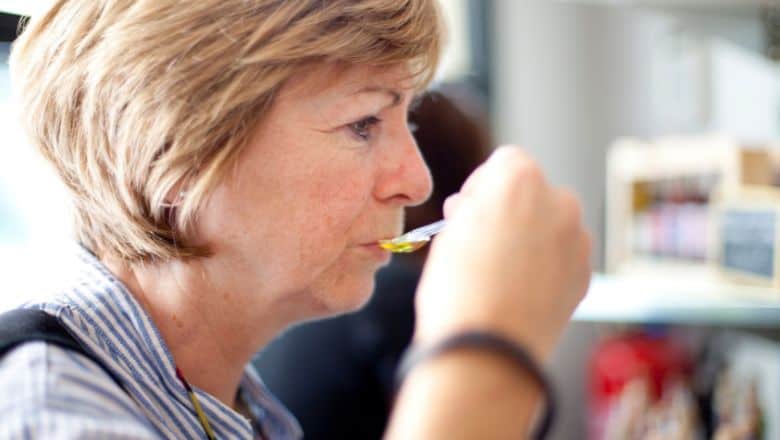Olive Oil Sommeliers: What Are They and How To Become One?
Olive Knowledge is a part of Amazon Associates. As an Amazon Associate, we earn from qualifying purchases. Read our Affiliate Disclosure to learn more.
Have you heard about olive oil sommeliers? Honestly, not many people know that there are professional olive oil tasters, unlike wine sommeliers. In this post, I’ll show you everything about olive oil sommeliers and how you can become one.
Key Takeaways:
- Olive oil sommeliers specialize in olive oil quality, taste, and culinary pairing.
- Their expertise is increasingly valued in the culinary and food industries.
- Training involves learning tasting techniques and olive oil quality analysis.
- Essential skills include identifying quality, negative tastes, and the influence of terroir.
- The role is expanding, with sommeliers becoming key figures in the food and restaurant sectors.
What is an Olive Oil Sommelier?

An olive oil sommelier is an expert in the field of olive oil, not only in terms of quality and taste but also in the production and use of the product.
A good olive oil sommelier will be able to advise chefs and other users on the correct pairing of certain olive oil with certain foods. The sommelier will show the cook the best way to use the oil in the dish they wish to prepare.
When it comes to the production of olive oil, they will also understand the processes and the elements that may have an adverse effect on the quality of the end product.
We mentioned wine earlier, so is a wine sommelier the same as an olive oil sommelier? Although they perform some similar roles, there are differences, and these are down to the fact that while oil and wine are both produced using raw fruit, the process is very different.
Yet the complexities in quality olive oil are as many as in fine wine. For many people, however, buying olive oil off the shelf in a store is the same as buying wine – find a bottle in your price range, and it should be good.
That’s not how to do it!
Before we go on to talk about becoming an olive oil sommelier, we want to briefly look at what you are searching for when you taste olive oil.
How to Taste Olive Oil Like a Sommelier

Generally speaking, Extra Virgin Olive Oil – the purest version – is where you should be looking. A decent chef will not use any other.
It is not possible to become proficient in tasting olive oil (check our guide) without training and practice, which we will talk about later on – but we feel it will benefit the reader to understand the negative and positive traits that they will be looking for.
Let’s start with the negatives, the tastes you don’t want to find in your olive oil. This is not an exhaustive list, but it does cover the most common signs of low quality olive oil.
- Rancidity is found when the fruit has been spoiled. This will be obvious to the taster and happens with all fruits.
- Fustiness is caused by the olives having been left standing too long before they were milled (the process that creates olive oil.)
- A Muddy taste signifies poorly cleaned equipment that has spoilt the fruit.
The problem is we cannot accurately describe these tastes on the page. Recognizing them will come with training and experience, and we’ll be talking about training to be an olive oil sommelier later.
The following are the tastes and characteristics of olive oil that a sommelier will be looking for:
- Fruitiness is the taste of well-grown and fresh healthy fruit.
- Bitterness comes naturally with olives and is a prime characteristic of quality olive oil.
- Pungency – the smell of the oil – is another trait that trained and expert sommeliers will be familiar with.
We believe that we’ve kept this section as simple as possible because it can get quite complex when delving deeper into the wonders of quality olive oil.
Next, how to train as a sommelier and how long it may take you to become proficient in tasting and understanding olive oil.
How to Become an Olive Oil Sommelier
It is a fact that olive oil sommeliers are becoming more in demand. This is because chefs, food buyers, and the general public are recognizing the great gulf between good and poor olive oil.
The only way to tell the difference is as described above – being able to understand the taste.
Olives – like grapes – inherit characteristics of the terroir in which they are grown, meaning the local soil and other influential factors. The very best sommeliers may be able to tell you from taste where an individual bottle is from!
We want to give you a brief outline of how to start on your path to becoming an olive oil sommelier.
The first step is to find a course that trains olive oil sommeliers, so here’s how to begin.
Best Courses and Training Programs to Become an Olive Oil Sommelier
There are many choices when you want to begin learning the skills an olive oil sommelier requires. It may be that online learning is your choice, in which case you should investigate the ESAO course.
ESAO is the Olive Oil School of Spain, dedicated entirely to the product. Courses can be undertaken remotely and online in a range of languages. There is also a physical campus.
Online learning gives the student the option to take as long as they wish. This is great for those already in employment who want to further their career.
During the course, you will learn the following skills:
- How to taste olive oil and what to look for.
- How to differentiate between different types of olive oil.
- Characteristics of different olive varieties.
- Analysis of the quality and flavor of olive oil.
These are just the main elements, and there is much more. Once you have completed the course and are certified as an olive oil sommelier, you are able to take a further course that goes into more technical detail, leaving you with a double degree in olive oil.
Olive Oil School – see here – is another recognized facility offering a range of accredited courses in the olive oil sphere. They have online courses and campus study in cities in various countries and provide education in production and further understanding of olive oil and its health properties.
Some courses take several weeks, but one that is highly rated and takes 40 hours is the Olive Oil Sommelier Certificate offered in Italy by MOOO and recommended by the Ministry of Agriculture and the International Olive Oil Council (IOOC). We suggest any course endorsed by the latter will be a good starting point.
These are just a few of the available courses for beginners and those who want to expand their skills.
Skills and Qualities of a Successful Olive Oil Sommelier
In the sections above, we have outlined the skills a sommelier requires – and explained that they are acquired by training and experience – so let’s have a quick recap before we give a few short bios of well-known olive oil sommeliers.
- The ability to recognize the beneficial elements of olive oil by tasting.
- An understanding of the negative tastes that tell of poor quality.
- The influence of the terroir in which the olives were grown.
- The difference between early and late harvest olive oil.
- The different types of olive oil and what foods they should be paired with.
- Best practices for producing high-quality olive oil.
These are all skills – and there are more – that will be gained during your course or courses of study.
We’ve all heard of celebrity chefs, so what about celebrity olive oil sommeliers? Not quite on the same scale, but there are some who have made a name for themselves.
Popular Olive Oil Sommeliers
The olive oil sommelier is becoming more widespread as restaurants, manufacturers, plus other users recognize the benefits of using the experience of an expert in choosing the best oil.
Here are a few of the better-known olive oil sommeliers, each of whom is a member of the Olive Oil Times Education Lab, which is also worth reading up on as it offers education courses for new sommeliers run by some of the best in the business.
- Wilma van Grinsven is an experienced sommelier from The Netherlands who has written acclaimed books on olive oil and is highly respected in the industry.
- Sergio Panzarella is a qualified and experienced sommelier who is also the CEO and founder of Food for Health, which is dedicated to researching natural products for healthier food.
- Jodi Kiel Seely is the owner of Tree to Table Imports, a thriving business in the USA and a qualified sommelier.
- Jenny Russell runs a business in the USA importing quality olive oils from small family growers in Italy and Spain and is an acknowledged sommelier.
These are just a few of the many olive oil sommeliers who are becoming far more recognized for their importance in continuing the tradition of fine olive oil production that goes back many centuries.
